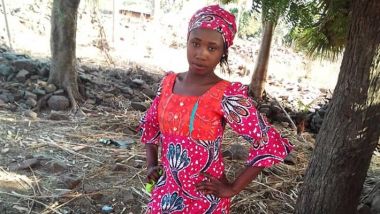Sing for the freedom of Leah Sharibu and others like her

When I was 15 years old, I would do this routine every day without fear: wake up, pray, get the school bus, see my friends, get registered, go to my lessons, have break, go to lessons, have lunch, go to more lessons, finish school, go home and do it all over again.
Having Nigerian parents, they would always say to me, 'Make sure you come HOME' or 'DON'T GO ANYWHERE, JUST COME HOME.'
I can imagine Leah Sharibu's parents told her something similar, but in her case the threat was even more serious. One day, she did not come home. She still hasn't returned home. On 19 February 2018, Leah was abducted from her school by fighters from the Islamic State West Africa Province (ISWAP).
She was one of 110 schoolgirls abducted by the terrorist group Islamic State West Africa Province on that day, but while all of her surviving classmates were released a month later following government negotiations, Leah has remained the terrorists' captive ever since, after she refused to renounce her faith as a precondition for her release.
Her abduction and inability to return home speaks volumes about how women and girls are insufficiently protected, and how Christians and their communities are amongst the most vulnerable in northern and central Nigeria.
Freedom is not a privilege; it is a right belonging to every human being
As a young person freedom meant a lot of things. It meant I could dream without restrictions. I could dream of becoming a doctor, a runner, an academic or a soldier. I could even change my mind when I did not want to be those things anymore. However, one thing I was not free to do as a Nigerian in the UK was to skip school. There was no discussion about it.
The universal prayer of all Nigerian parents is that their children will be better than them, but for Nathan and Rebecca Sharibu that prayer has now become for Leah to come back home.
In the years since her abduction, the terrorists have declared that Leah, as well as the abducted Christian nurse Alice Ngaddah, were their "slaves for life" and that "it is now lawful for us to do whatever we want with them."
I am not sure what Leah's dreams were before she was kidnapped. Perhaps she wanted to be a head girl or senior prefect in school. I am not sure what her dreams are now in captivity. Certainly, no-one dreams to be labelled a 'slave for life.'
Nigeria: 'one nation bound in freedom, peace and unity'
There is a particular line in Nigeria's national anthem that states, 'one nation bound in freedom, peace and unity.' Yet, Leah is without freedom, a slave to terrorists who has not been reunited with her family for over three years.
Although Leah's story starts in Yobe state, where she was abducted, hers is by no means an isolated experience. There are many men, women and children in Nigeria who have had their freedom taken away in a similar manner.
Perhaps most infamously, on 14 April 2014, 276 female students were abducted from the Government Girls Secondary School in Chibok, Borno state by Abubakar Shekau's faction of Boko Haram and 217 of these girls are from families belonging to the Ekklesiyar Yan'uwa a Nigeria (EYN, the Church of the Brethren in Nigeria). Some managed to escape. Others were released following negotiations, and allegedly in exchange for imprisoned key Boko Haram fighters and significant sums of money - 110 girls remain unaccounted for.
According to the United States Commission on International Religious Freedom (USCIRF), '"vulnerable religious communities in Nigeria are under attack" and "the Nigerian government has not done more to prevent this violence and bring justice to the perpetrators."'
In other words: life in Nigeria is becoming very dangerous. Men are killed, and women and girls are kidnapped by terrorist groups functioning in the northeast, and boys who are not killed can face forcible recruitment. Even more worrisome in the case of the Dapchi school abductions are allegations that security forces have failed to act despite prior warning of an impending terrorist attack.
The United Nations Children's Fund (UNICEF) estimates that at least a million students in Nigeria could miss school this year due to the rise in mass school abductions and insecurity.
Raise your voice
In their 2021 Annual Report, USCIRF "recommended that the U.S. State Department designate Nigeria as a Country of Particular Concern (CPC) for engaging in and tolerating systematic, ongoing, and egregious religious freedom violations." This designation must be maintained until the government does far more to protect vulnerable religious communities.
However, even more needs to be done. Leah needs to be freed, as do so many others like her.
On 28 October, CSW is leading a protest outside the Nigerian High Commission in London at 1pm as part of the Sing for Freedom campaign, which aims to raise awareness about Leah, the Chibok Girls, Alice Ngaddah and hundreds of others who remain in captivity today. You can join the protest or take part in the Sing for Freedom Challenge online.
Too many years have been stolen from Leah's life. Her boldness to refuse to change who she believes in in the face of one of the world's deadliest terrorist factions is testimony to the depth of her faith and her courage. She has done what she could, now it is time for us and the world to demand her release.
Divine Olomo is an Advocacy Intern at CSW.











